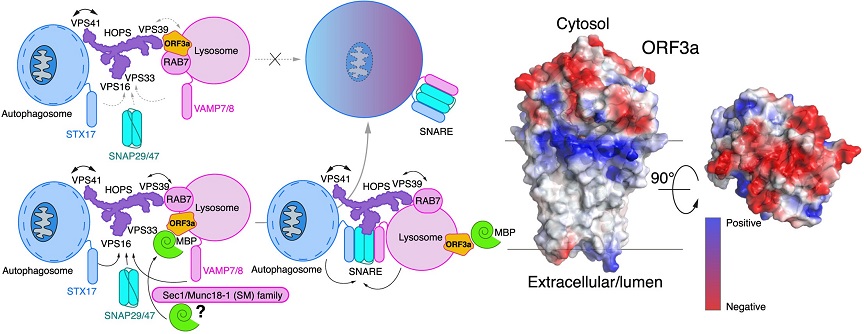Russian Study Finds That Myelin Basic Protein Antagonizes SARS-CoV-2 ORF3a-Induced Autophagy Inhibition
Nikhil Prasad Fact checked by:Thailand Medical News Team May 04, 2024 11 months, 3 weeks, 1 day, 16 hours, 40 minutes ago
COVID-19 News: In the realm of virology, understanding how viruses interact with host cells is paramount to developing effective treatments and interventions. The ongoing COVID-19 pandemic, caused by the SARS-CoV-2 virus, has spurred intense research into the mechanisms by which this virus infects and affects human cells. One intriguing area of study involves the interplay between SARS-CoV-2 proteins and host cellular components. A recent study conducted by researchers at the Russian Academy of Sciences, Moscow Institute of Physics and Technology, and Evdokimov Moscow State University of Medicine and Dentistry that is covered in this
COVID-19 News report, has shed light on a novel interaction between myelin basic protein (MBP) and the SARS-CoV-2 protein ORF3a, with potential implications for understanding viral pathogenesis and host defense mechanisms.
 Graphical Abstract - Myelin Basic Protein Antagonizes SARS-CoV-2 ORF3a-Induced Autophagy Inhibition
Autophagy Inhibition by SARS-CoV-2
Graphical Abstract - Myelin Basic Protein Antagonizes SARS-CoV-2 ORF3a-Induced Autophagy Inhibition
Autophagy Inhibition by SARS-CoV-2
One of the distinctive features of SARS-CoV-2 infection is its ability to inhibit autophagy, a crucial cellular process involved in removing damaged organelles and pathogens. ORF3a, a viral protein encoded by SARS-CoV-2, has been shown to hinder the fusion of autophagosomes with lysosomes, thereby disrupting the autophagic clearance of cellular debris and potentially aiding viral replication. This inhibition occurs through ORF3a's interaction with VPS39, a component of the homotypic fusion and protein sorting (HOPS) complex that plays a key role in autophagosome-lysosome fusion.
The Role of Myelin Basic Protein
In this study, researchers investigated the role of MBP, a structural component of the myelin sheath in neurons, in the context of SARS-CoV-2 infection. They found that MBP interacts with several SARS-CoV-2 proteins, including ORF3a, N, E, nsp9, and nsp16, within mammalian cells. Of particular interest was the observation that MBP counteracted ORF3a-mediated autophagy inhibition. Co-expression of MBP with ORF3a led to the restoration of autophagy in mammalian cells that had been inhibited by the viral protein.
Mechanisms of Interaction
The researchers delved deeper into the mechanisms underlying the interaction between MBP and ORF3a. They found that the basic charge of MBP was instrumental in suppressing ORF3a-induced autophagy inhibition. This was evidenced by the loss of binding ability and autophagy counteraction when using deaminated variants of MBP. These findings suggest a potential protective role for MBP in maintaining the autophagosome-lysosome fusion machinery during SARS-CoV-2 infection.
Implications for Neurological Manifestations
The study also touched upon the neurological manifestations associated with SARS-CoV-2 infection. It is well-established that the virus can penetrate the central nervous system (CNS) through various routes, leading to a range of neurological symptoms. The researchers speculated that MBP's role in counteracting au
tophagy inhibition by ORF3a could have implications for neurological outcomes in COVID-19 patients, particularly those with pre-existing conditions such as multiple sclerosis (MS).
Link to Multiple Sclerosis and COVID-19 Outcomes
The mention of MS is significant, as previous studies have shown that MBP undergoes deimination in MS patients, which could potentially impact its interactions and functions. The researchers hypothesized that the deimination of MBP observed in MS patients might contribute to worse outcomes in COVID-19 and exacerbate post-COVID-19 neurological symptoms in individuals with MS. This highlights the complex interplay between viral infections, host proteins, and pre-existing medical conditions.
Insights into SARS-CoV-2 Pathogenesis
Overall, this study provides valuable insights into the molecular mechanisms of SARS-CoV-2 pathogenesis, particularly regarding its interactions with host cellular components. By elucidating how MBP counteracts ORF3a-mediated autophagy inhibition, the researchers have uncovered a potential avenue for therapeutic interventions aimed at restoring cellular homeostasis in the face of viral infection. Additionally, the study underscores the importance of considering host factors and comorbidities in understanding COVID-19 outcomes and complications.
Conclusion
In conclusion, the study conducted by researchers from Russian institutions sheds light on the intricate interplay between myelin basic protein and SARS-CoV-2 proteins, particularly ORF3a. The findings not only enhance our understanding of viral pathogenesis but also hint at potential therapeutic targets for mitigating the impact of COVID-19 on cellular processes and neurological health. Further research in this area promises to unveil additional layers of complexity in the host-virus interaction landscape, paving the way for more effective strategies to combat COVID-19 and its associated complications.
The study findings were published in the peer reviewed journal: Biochimie.
https://www.sciencedirect.com/science/article/abs/pii/S0300908424000944
For the latest
COVID-19 News, keep on logging to Thailand Medical News.
